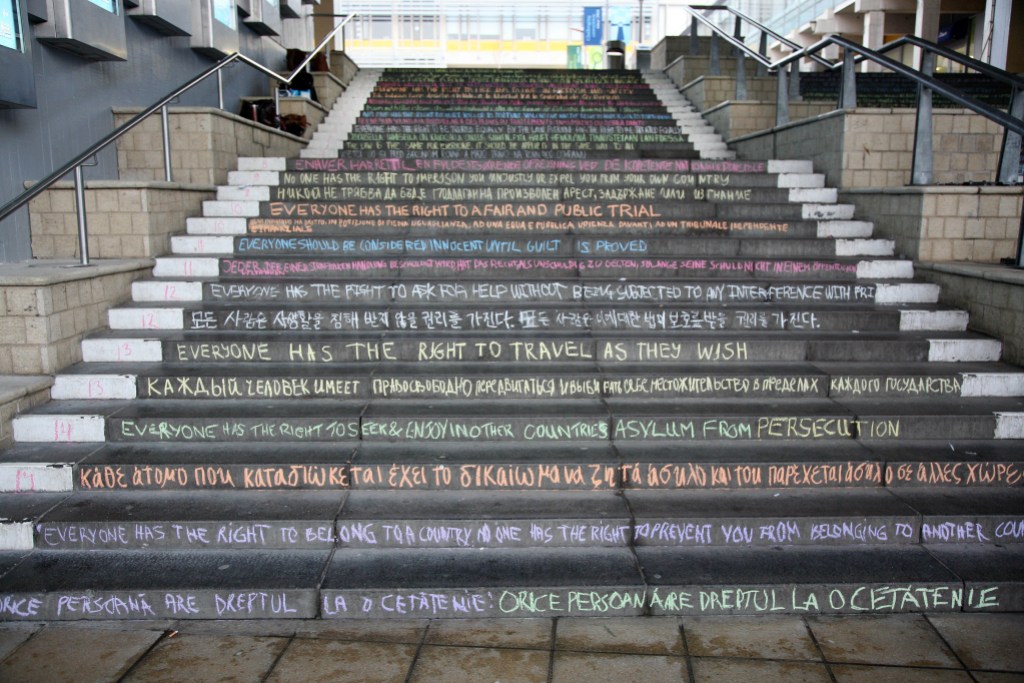
The Wikimedia Foundation affirmed its belief last year that knowledge is a human right in the announcement of our new Human Rights Policy. The policy was an important step forward in recognizing the role Wikimedia projects play in advancing human rights, and where the Foundation can be accountable for protecting the human rights of all people who use Wikimedia projects.
When we released the new policy, we made a commitment to share a Human Rights Impact Assessment that further informed our Human Rights Policy and wider human rights work as an organization. The assessment evaluated whether and how Wikimedia projects, platforms, and activities might cause or facilitate inadvertent human rights harms to Wikimedia volunteers, Foundation employees, readers, and others affected directly or indirectly by free knowledge projects. Today, we’re sharing that assessment on Meta-Wiki.
The assessment outlines human rights risks to Wikimedia projects according to five categories: harmful content, harassment, government censorship and surveillance, risks to child rights, and limits to knowledge equity. Importantly, this report contains 59 recommendations for the Foundation. The Foundation has already implemented some recommendations, like adopting a human rights policy and hiring a Human Rights Lead. However, not all of the report’s recommendations may be feasible. We welcome feedback and discussion from volunteers, affiliates, and other movement stakeholders to determine which recommendations the Foundation should prioritize in order to benefit Wikimedia projects and the wider movement.
About the Human Rights Impact Assessment
The assessment was finalized and shared with the Foundation in July 2020. In the two years since then, both Article One (the agency that produced the report for us) and Foundation staff carried out a comprehensive review of the report to remove or generalize any information that could put individuals or Wikimedia projects at risk. In that time period, the Foundation also took steps to advance human rights work, including some recommendations in the assessment, which aligned with the Foundation’s existing priorities.
Some of these steps include:
- Co-developing a Universal Code of Conduct alongside movement volunteers
- Strengthening human rights expertise at the Foundation, including the creation of a Human Rights team
- Strengthening human rights resources and best practices available to the movement
- Approving our Human Rights Policy, which commits the Foundation to:
- conducting ongoing human rights due diligence
- tracking and publicly reporting on our efforts to meet our human rights commitments
- using our influence with partners, the private sector, and governments to advance and uphold respect for human rights, and
- providing access to effective remedies when harms have occurred
- conducting ongoing human rights due diligence
- Continuing human rights due diligence efforts
- Mitigating the impacts of disinformation on Wikimedia projects in partnership with volunteers
These initial steps will allow the Foundation to continue responding meaningfully to the recommendations and findings in the report.
How Wikimedians Can Engage with the Assessment
This assessment can help all stakeholders in the Wikimedia movement to better understand the human rights risks and threats that we jointly face, and the work required to address those risks. By better understanding these risks, the Foundation, volunteers, and affiliates can work together to protect both our movement and our people. To this end, we have translated the assessment’s foreword and executive summary into Arabic, Chinese, French, Russian, and Spanish.
The Foundation will continue to partner with the communities to learn more about current and emerging human rights threats and our role in responding to these threats. In May 2022, the Public Policy and Global Advocacy team hosted a series of regionally-focused community conversations to begin this dialogue, but there will be more opportunities in the future. This month, July 2022, Wikimedians can join the following events to ask questions about this assessment, provide feedback, and raise other human rights concerns:
- 14 July (18:00–19:30 UTC): Community Affairs Committee Meeting
- 28 July (12:00 UTC): Global Advocacy Community Conversation Hour
- 28 July (17:00 UTC): Global Advocacy Community Conversation Hour
Wikimedians can also share their feedback about this assessment and the risks and recommendations it identifies on the Movement Strategy Forum.
In the long run, mitigating the risks identified in our Human Rights Impact Assessment is key to the health, vitality, and sustainability of the Wikimedia movement. Disinformation, government surveillance, and censorship represent existential threats to freedom of expression, and also to the broader free knowledge community. Taking steps to reduce the potential harm these and other threats can have on the projects is necessary to protect the projects’ independence as well as the people who make these projects flourish.
If you would like to raise a human rights-related concern to the Foundation, you can email talktohumanrights@wikimedia.org to reach the Human Rights Team. If you have reason to believe that your life is in immediate danger, contact emergency@wikimedia.org.

Can you help us translate this article?
In order for this article to reach as many people as possible we would like your help. Can you translate this article to get the message out?
Start translation